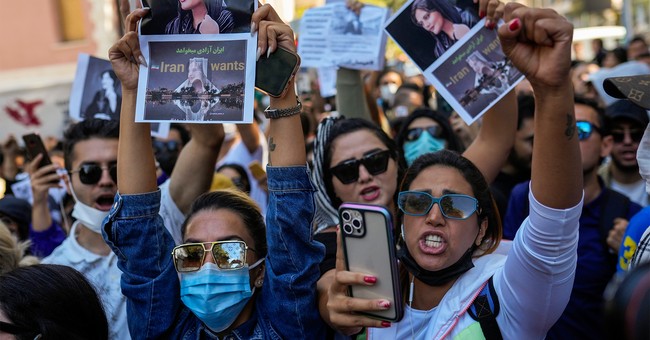Qadhi said that he received a question from one of his followers, a high-school girl: “Is it true that our religion forces the women to wear the hijab? Can an Islamic government have this right? Shouldn’t worship be done freely?” Qadhi responded by warning about getting involved in hypothetical issues that are far beyond our own responsibility: “I am not responsible for something happening five thousand miles away.” He then launched into a lengthy critique of Western secularism, comparing it unfavorably to Islamic law, and argued that all countries, including those in the secular West, enforce codes of morality; they just differ in their content.
On that basis, Qadhi then advanced a curious argument: “Even in the West,” he explained, “there are laws against indecency, and there are moral prescriptions about what one can and should and must wear.” He added: “If you show certain parts of the body, and if you show certain organs of your body, you shall be fined, and if you continue to do so, you shall go to jail. Now, the issue therefore is not over, Can the state control what you can or cannot show. The issue is, How much can you show? So some Middle Eastern countries might have a lot more. And, uh, here in America, it is a lot less. But the notion of the state telling you a minimal amount that you can wear, that is pretty much universal.”
That’s true as far as it goes, but Qadhi is ignoring the fact that women have received draconian and disproportionate sentences for not wearing the hijab, and 22-year-old Mahsa Amini was killed in police custody after being arrested for not wearing her hijab properly in the eyes of the security forces. That already takes the protests in Iran far beyond any question of the right of the state to make laws regarding public indecency. Nor is brutality against Muslim women who dare not to wear the hijab limited to Iran. Aqsa Parvez’s Muslim father choked her to death with her hijab after she refused to wear it. Amina Muse Ali was a Christian woman in Somalia whom Muslims murdered because she wasn’t wearing a hijab. Forty women were murdered in Iraq in 2007 for not wearing the hijab. Alya Al-Safar’s Muslim cousin threatened to kill her and harm her family because she stopped wearing the hijab in Britain. Amira Osman Hamid faced whipping in Sudan for refusing to wear the hijab. An Egyptian girl, also named Amira, committed suicide after being brutalized by her family for refusing to wear the hijab. Muslim and non-Muslim teachers at the Islamic College of South Australia were told they had to wear the hijab or be fired. Women in Chechnya were shot with paintballs by police because they weren’t wearing hijab. Other women in Chechnya were threatened by men with automatic rifles for not wearing hijab.
On that basis, Qadhi then advanced a curious argument: “Even in the West,” he explained, “there are laws against indecency, and there are moral prescriptions about what one can and should and must wear.” He added: “If you show certain parts of the body, and if you show certain organs of your body, you shall be fined, and if you continue to do so, you shall go to jail. Now, the issue therefore is not over, Can the state control what you can or cannot show. The issue is, How much can you show? So some Middle Eastern countries might have a lot more. And, uh, here in America, it is a lot less. But the notion of the state telling you a minimal amount that you can wear, that is pretty much universal.”
That’s true as far as it goes, but Qadhi is ignoring the fact that women have received draconian and disproportionate sentences for not wearing the hijab, and 22-year-old Mahsa Amini was killed in police custody after being arrested for not wearing her hijab properly in the eyes of the security forces. That already takes the protests in Iran far beyond any question of the right of the state to make laws regarding public indecency. Nor is brutality against Muslim women who dare not to wear the hijab limited to Iran. Aqsa Parvez’s Muslim father choked her to death with her hijab after she refused to wear it. Amina Muse Ali was a Christian woman in Somalia whom Muslims murdered because she wasn’t wearing a hijab. Forty women were murdered in Iraq in 2007 for not wearing the hijab. Alya Al-Safar’s Muslim cousin threatened to kill her and harm her family because she stopped wearing the hijab in Britain. Amira Osman Hamid faced whipping in Sudan for refusing to wear the hijab. An Egyptian girl, also named Amira, committed suicide after being brutalized by her family for refusing to wear the hijab. Muslim and non-Muslim teachers at the Islamic College of South Australia were told they had to wear the hijab or be fired. Women in Chechnya were shot with paintballs by police because they weren’t wearing hijab. Other women in Chechnya were threatened by men with automatic rifles for not wearing hijab.

